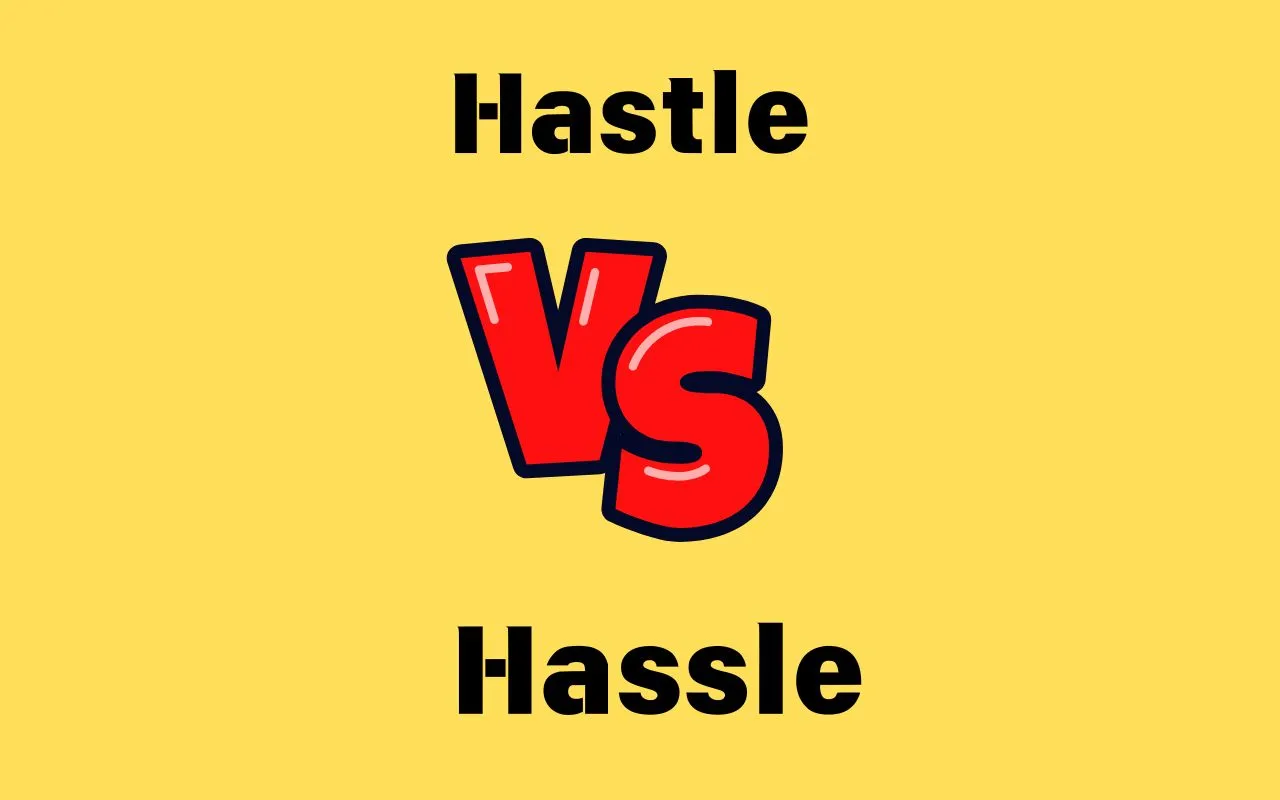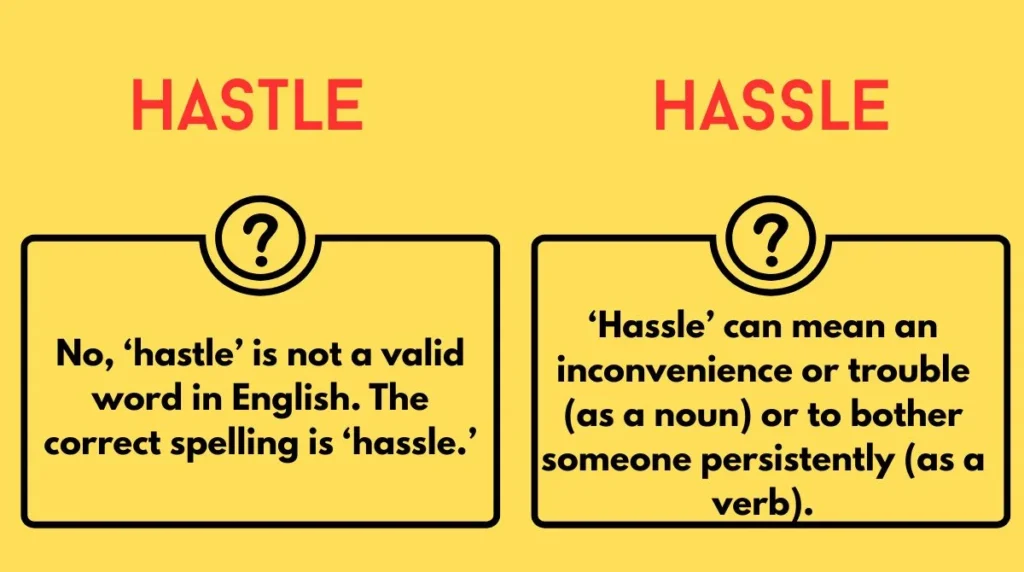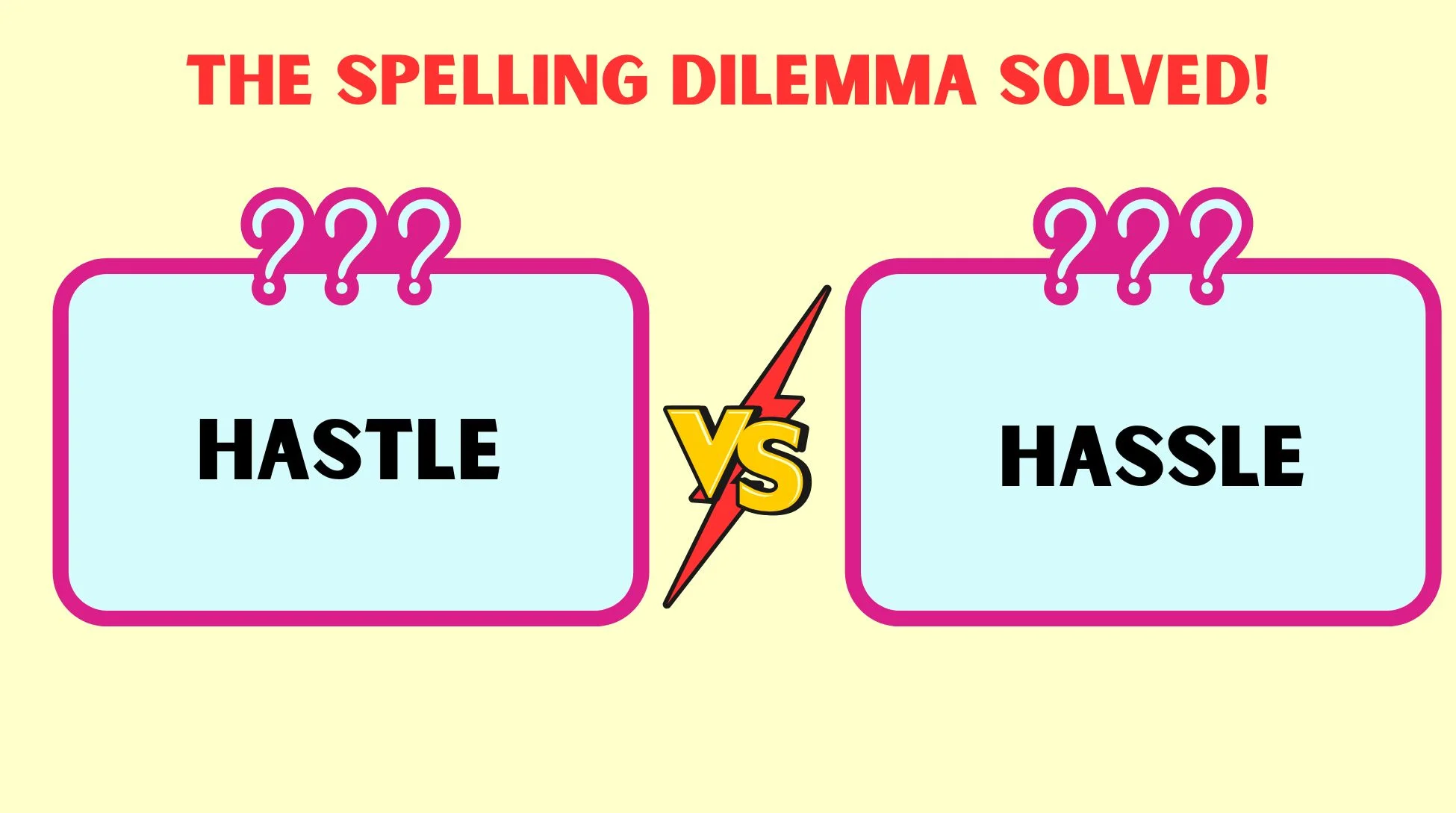Last updated on September 11th, 2025 at 07:57 am
Language can be tricky, especially when words look or sound similar but one of them isn’t actually a word.
Hassle and hastle are perfect examples. Many people find themselves typing or saying hastle instead of the correct word, hassle.
In this article, we’ll dive deep into these terms, explore the origins of hassle, and discuss why hastle has mistakenly entered some people’s vocabularies. By the end, you’ll know exactly when and how to use hassle correctly.
Understanding the Spelling: Hassle vs Hastle
Let’s get straight to the point—hassle is the correct spelling, while hastle is not a valid word in English. The confusion often arises from how the two words sound when spoken.
However, in formal and informal writing, only hassle is recognized and accepted.
Common Errors
- Mistake: “Dealing with customer service was such a hastle.”
- Correction: “Dealing with customer service was such a hassle.”
The key to avoiding this mistake is recognizing that hastle is a misspelling and has no defined meaning in English.
Confused between ‘hastle’ and ‘hassle’? Only one of these is correct! Dive into this guide to learn the meaning, origins, and proper usage of ‘hassle’ while avoiding common spelling mistakes.
The Definition of Hassle in Different Contexts
The word hassle is both a noun and a verb, giving it flexibility in usage. Let’s explore its meanings in various contexts.
As a Verb: The Act of Hassling
When used as a verb, hassle refers to bothering or pestering someone persistently. It’s often used in situations where one person is trying to force another into action or agreement.
Examples:
- “Stop hassling me about cleaning my room—I’ll do it later.”
- “The salesperson kept hassling me to buy the more expensive option.”
In these cases, the act of hassling involves irritation or undue pressure.
As a Noun: The Concept of a Hassle
As a noun, hassle describes something that is inconvenient, difficult, or annoying to deal with. It often refers to unnecessary effort or trouble.
Examples:
- “Finding parking downtown is such a hassle.”
- “Getting a visa for international travel can be a real hassle.”
In this sense, hassle captures the frustration or annoyance caused by a situation or task.
Common Usage of the Word ‘Hassle’ in Sentences
Here’s how hassle is commonly used in everyday sentences:
- “Returning items without a receipt can be a hassle.”
- “She doesn’t like to hassle people, but she needed help.”
- “Why go through the hassle of cooking when we can order takeout?”
Whether as a noun or verb, hassle conveys irritation, annoyance, or persistence.

Etymology: Tracing the Origin of ‘Hassle’
The origin of hassle is relatively modern compared to many English words. Its first recorded use was in the United States during the mid-20th century.
Possible Origins
- The word may have evolved from hustle, reflecting a sense of urgency or pressure.
- Others suggest it could be related to haggle, which means to argue persistently over a price.
While the exact roots remain uncertain, hassle quickly gained popularity as a term for minor annoyances or persistent pressure.
Common Meanings and Usage
Over time, hassle has taken on various nuances in meaning:
| Meaning | Examples |
|---|---|
| Annoyance or Trouble | “Dealing with that form was such a hassle.” |
| Persistent Bothering | “He kept hassling me to finish the report.” |
| Irritating Task | “Assembling furniture is always a hassle.” |
These variations show the versatility of the word in describing different types of frustration.
Hassle Through Time
The term hassle has remained relevant since its introduction, adapting to both casual and professional usage. Its broad application makes it a staple in modern English, whether you’re describing workplace challenges or personal frustrations.
For example:
- In the 1970s, hassle was commonly used to describe interpersonal conflicts or disputes.
- Today, it’s often associated with bureaucratic or logistical challenges, such as “What a hassle it is to renew a passport!”
Why the Confusion? Exploring the Spelling Challenges with ‘Hassle’
Why do so many people mistakenly use hastle? Here are some reasons:
- Phonetic Similarity: The word hassle has a soft “a” sound, which some might mishear as hastle.
- Typing Errors: People often type phonetically, leading to the incorrect hastle.
- Lack of Awareness: Many don’t realize that hastle isn’t a word, so they continue to use it informally.
The best way to avoid this error is by consciously practicing the correct spelling: hassle.
Tips to Remember the Correct Spelling: ‘Hassle’
Here are some practical tips to help you remember how to spell hassle correctly:
- Think of the Double “S” for Stress: A hassle is often stressful, and the double “s” mirrors that feeling.
- Mnemonic Device: “Handling Annoying Stuff? Spell it with Hassle.”
- Practice with Sentences: Write a few sentences using the word hassle correctly to reinforce its spelling.
‘Hassle’ in Popular Culture and Examples
The term hassle has frequently appeared in movies, music, and literature, cementing its place in popular culture.
- In Movies: Characters often use the term to express frustration, such as, “Why go through the hassle?”
- In Music: Lyrics in pop and rap songs sometimes include hassle to convey struggles or challenges.
Using ‘Hassle’ in Literature
Although hassle is more common in casual speech, it has made its way into contemporary literature. Authors use it to highlight characters’ struggles or frustrations.
Example from Fiction:
- “The hassle of getting through airport security made her dread flying altogether.”
Such usage helps convey realism and relatability in modern storytelling.
Real-life Examples: When ‘Hassle’ Becomes Tumultuous
Example 1: Customer Service
- A customer waiting for hours to resolve a billing issue might say, “What a hassle this has been!”
Example 2: Travel
- Delayed flights, long security lines, and lost luggage are often described as “the hassles of air travel.”

FAQs
Is ‘hastle’ a word in English?
No, ‘hastle’ is not a valid word in English. The correct spelling is ‘hassle.’
What does ‘hassle’ mean?
‘Hassle’ can mean an inconvenience or trouble (as a noun) or to bother someone persistently (as a verb).
Why do people confuse ‘hassle’ and ‘hastle’?
The confusion arises from phonetic similarity and common typing errors. ‘Hassle’ has a soft “a” sound, which some mistakenly interpret as hastle.
How can I remember the correct spelling of ‘hassle’?
Think of the double “s” for ‘stress’—hassles are often stressful! Use mnemonics like “Handling Annoying Stuff? Spell it with Hassle.”
Can you give examples of how to use ‘hassle’ in sentences?
- “Getting through security at the airport is such a hassle.”
- “Stop hassling me about cleaning my room!”
Where did the word ‘hassle’ come from?
The term ‘hassle’ originated in the U.S. in the mid-20th century, possibly evolving from words like ‘hustle’ or ‘haggle.’
Conclusion
So, hassle or hastle? The answer is clear: hassle is the correct spelling and the only recognized term in English.
Whether you’re using it as a noun to describe frustration or as a verb to describe persistent bothering, hassle is a versatile word that fits seamlessly into modern communication.
By understanding its meaning, usage, and origins, you can confidently use hassle without any confusion. And remember—when in doubt, think of the double “s” to avoid the nonexistent hastle!
Feel free to share this guide or bookmark it for future reference, especially if you’ve ever second-guessed your spelling!
